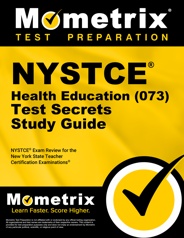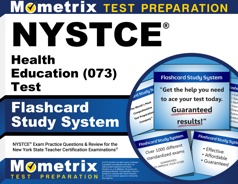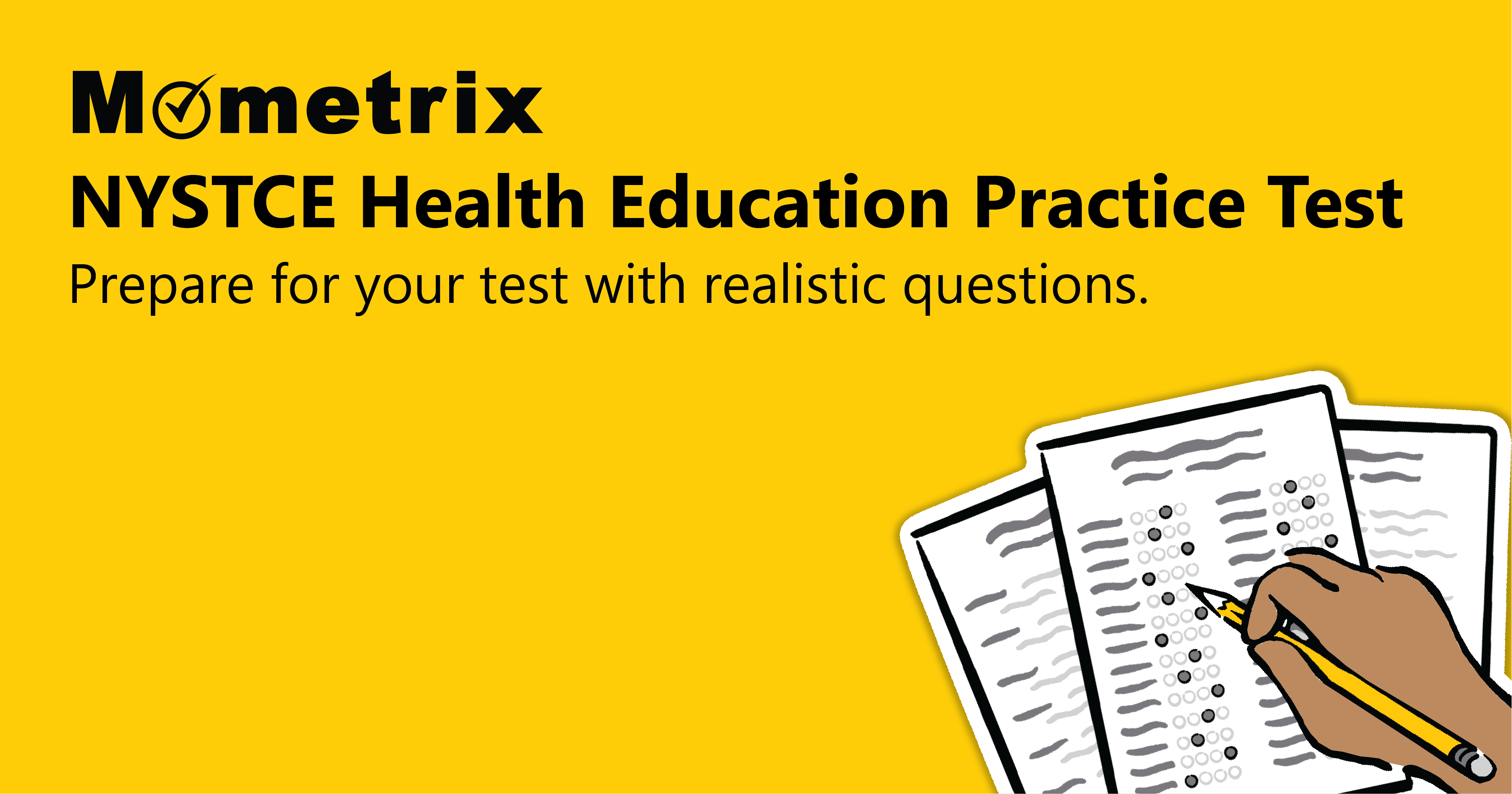The New York State Teacher Certification Exams program (NYSTCE) was designed for teachers in New York State to ensure proficiency in specific educational areas. The NYSTCE Health Education exam is designed for prospective health teachers in the state of New York.
Click “Start Test” above to take a free NYSTCE Health Education practice test, and check out our premium-quality NYSTCE test prep resources by clicking the links below!
NYSTCE Health Education Exam Outline
The NYSTCE Health Education exam contains 90 selected-response questions and one constructed-response question, and you will be given a time limit of 3 hours and 15 minutes.
The exam is split into six competencies:
1. Health Promotion (18 questions)
The questions in this competency are designed to assess your knowledge pertaining to the following:
- The stages and characteristics of physical, cognitive, social, and emotional development during childhood, adolescence, and adulthood
- Influences on growth, development, and health and wellness
- Key aspects of anatomy and physiology
- Personal care and hygiene practices that have positive effects on health and wellness
- Causes of, modes of transmission of, signs and symptoms of, and treatments for common disorders, illnesses, and diseases
- Risk factors that increase or decrease susceptibility to illness and disease
- Various approaches for preventing communicable, noncommunicable, and chronic diseases
- Waring signs and symptoms of mental distress, depression, self-harm, eating disorders, and suicidal tendencies
- The role of nutrition in health promotion
- The nutritional needs and concerns for various health conditions, ages, activity levels, and purposes
- Nutritional and dietary planning guidelines, tools, and recommendations
- The role regular physical activity plays in enhancing lifelong physical and mental health
- Major components of health-related physical fitness
- Principles and activities for managing weight
- Various health-related careers
2. Risk Reduction (18 questions)
The questions in this competency are designed to assess your knowledge pertaining to the following:
- Recognizing risks and unsafe conditions in the community, school, and home
- Principles, precautions, and rules pertaining to traffic and pedestrian safety
- Self-management strategies
- Common causes of accidental death and unintentional injuries
- Procedures for responding to life-threatening respiratory and cardiac emergencies
- Recognizing the existence of an emergency and providing first aid and care
- Comprehensive knowledge of tobacco, alcohol, and other chemicals and drugs
- Factors that influence decisions to use or abstain from tobacco, alcohol, and other chemicals and drugs
- Preventing the use of tobacco, alcohol, and other harmful chemical and drugs.
- Promoting sexual health
- The causes and influences of violence and abuse
- HIV/AIDS history, epidemiology, prevention, transmission, and treatment
3. Personal and Social Health Skills (18 questions)
The questions in this competency are designed to assess your knowledge pertaining to the following:
- Types of effective communication
- Using communication skills to express desires, needs, and feelings in an appropriate manner
- Relationship management skills
- The causes and effects of positive and negative peer pressure
- Recognizing sources of stress
- Appropriate laws and policies pertaining to bullying, harassment, exclusion, intimidation, and discrimination
- Sources of interpersonal conflict
- Conflict prevention, management, and resolution
- Characteristics and purposes of reliable self-assessment tools
- Goal-setting techniques and skills to enhance health
- The impact of changes in abilities, priorities, and responsibilities on health goals, values, and resources
- Roles and responsibilities of effective parenting
- Using decision-making skills to enhance health and making independent and collaborative health-related decisions
- Advocating for self, community, and family
4. Health Literacy Skills (18 questions)
The questions in this competency are designed to assess your knowledge pertaining to the following:
- Influences on attitudes, behaviors, and perceptions related to health
- Communication pertaining to different types of messages to children and adolescents about nutrition, sexual activity, body image, violence, and tobacco and alcohol
- Persuasive methods used in health-related marketing and advertising
- Researching, locating, and accessing valid health-related information and services
- Analyzing and evaluating the accuracy, usefulness, and reliability of health-related information
- The roles of healthcare providers, agencies, and delivery systems
- Characteristics and roles of community, private, government, and nonprofit organizations in providing health promotion and disease prevention information and services
- Changes and problems that occur within families
- Laws, policies, agencies, and regulations that support community, family, and personal health
- Promotion of health-related consumer skills
- Factors and conditions in the natural and human environments that affect the health and safety of individuals and communities
- Conserving natural resources
5. Health Education Program Planning (18 questions)
The questions in this competency are designed to assess your knowledge pertaining to the following:
- Theories and models of health behavior
- Using theories and models of health behavior to plan, design, implement, and evaluate health education programs
- Planning and implementing effective and comprehensive health education programs
- Using and synthesizing professional resources and morbidity, mortality, and behavioral risk data
- Designing and implementing a health education curriculum
- Planning, delivering, and evaluating health education instruction that is consistent with best practices
- The role of the health education teachers as it extends beyond the classroom as a resource for health information
- Communicating and collaborating with colleagues, students, families, and health agency staff
- Connections between health education and other subject areas
- Fostering students’ application of critical-thinking, problem-solving, goal-setting, and decision-making skills
- Establishing partnerships with families, school professionals, and community members
- Differentiating instructional approaches, activities, settings, and grouping strategies
- Designing and using authentic health education assessment methods and instruments
- Appropriate uses, interpretations, and communication of assessment results
- Professional and ethical standards
6. Pedagogical Content Knowledge (1 question)
For this competency, you will be asked to apply pedagogical knowledge across multiple content domains to design instruction for students, analyze student understanding, and understand how students learn.
Check Out Mometrix's NYSTCE Health Education Study Guide
Get practice questions, video tutorials, and detailed study lessons
Get Your Study Guide
Exam Registration
To register for the NYSTCE Health Education (073) exam, you will need to create an NYSTCE account online and complete the registration process there. It is recommended that you complete the registration process at least 30 days before you take the exam.
During this process, you will be asked some questions about your educational history, as well as your current education level, first language, matriculation status, and the education code for the NYC Department of Education program type you are associated with.
The examination fee is $122.
Test Day
You should arrive at the testing center about 30 minutes early to allow time for the check-in process. Once you arrive, you will be asked to sign in and provide a valid form of government-issued photo ID. Along with your ID, you are also required to bring your own graphing calculator, as one will not be provided for you.
Before the exam begins, you will be asked to place all personal items in a locker outside the testing room, or you may be asked to leave them in your car.
Once the test begins, you will be allowed to take breaks. However, the timer will not be stopped during your break, so use your break time carefully.
How the Exam is Scored
Your total NYSTCE Health Education score is based on the number of questions you answered correctly, which is then reported as a numerical figure in the range of 400-600. To pass the exam, you must achieve a scaled score of 520.
You should receive your test results roughly 2-4 weeks after taking the exam. When you receive your score report, you will see your total score, your pass/fail status, and your scores for each subarea of the test.
Check Out Mometrix's NYSTCE Health Education Flashcards
Get complex subjects broken down into easily understandable concepts
Get Your Flashcards
FAQs
Q
How many questions are on the NYSTCE Health Education exam?
A
There are 91 questions on the exam.
Q
How long is the NYSTCE Health Education exam?
A
The time limit for the exam is 3 hours and 15 minutes.
Q
What is the passing score for the NYSTCE Health Education exam?
A
To pass the exam, you must achieve a minimum scaled score of 520.
Q
How much does the NYSTCE Health Education exam cost?
A
The examination fee is $122.
NYSTCE and New York State Teacher Certification Examinations are trademarks of the New York State Education Department and Pearson Education, Inc. or its affiliate(s). This page was developed by Mometrix Test Preparation. It was not developed in connection with Pearson Education, Inc., nor was it reviewed, approved or endorsed by these agencies.


